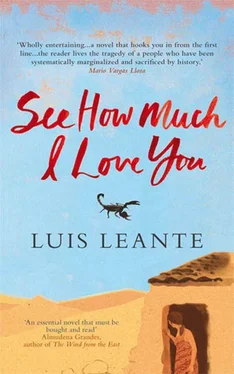burnous over her shoulders and covered her head with the hood. ‘You can do what you like, but I’m leaving.’ She pulled on the door and, just as she’d thought, found it padlocked. But she’d had it all planned since dawn. With a kick, she broke the lower planks; the wood was so dry that it splintered into smithereens. She waited a while and, seeing that no one was coming, gave it another kick. The hole became considerably larger. She gathered up her
burnous and crawled out. The midday sun was intense. ‘No,
señorita , no,’ was the last thing she heard before walking away. Her legs trembled; they felt weak. It had been more than ten days since she had walked such a long way without being watched — ten days that she and the other women had spent locked in that windowless hut built with bricks and cement blocks, with an asbestos ceiling that made the air unbreathable. Although she’d only seen the small oasis on the morning they’d brought them over as prisoners, she knew every inch of it through its sounds. The well was at the centre with a pulley to extract water; a few metres away was an enormous canvas which served as a tent. It was there that the men drank tea at all hours, chatting and arguing. There was rubbish everywhere. Under the palm trees, a more solid tent, with a rug at the entrance, provided shelter for Le Monsieur. Over the past nine nights, amid the silence of the desert, she’d heard his spine-chilling snores go on for hours. Near the tent she now saw the metallic glimmer of the Toyota. There was no one around. There was no sign of the truck except the tracks leading out into the inhospitable
hammada .3 She tried to stay calm and curb the euphoria she felt at being free.
She barely noticed the intensity of the sun in its zenith. She didn’t think twice: walking faster, she headed for the four by four. She did not run but walked decisively, without giving in to the terror that was beginning to seize her. Not once did she look back, or even sideways. And so, when she heard someone call out to her from behind, her heart jumped. Nevertheless she didn’t stop; she walked on and only turned her head when she recognised the voice following her. It was Aza, the only Saharawi of the group. She was running behind her, clutching her melfa , which was slipping down her shoulders, with both hands.
‘I’m coming with you, wait, I’m coming,’ she said in good Spanish. She waited for Aza and took her hand. They ran the rest of the way to the Toyota together. The woman opened the driver’s door and motioned to Aza to climb in from the other side. The Saharawi quickly did so. They sat for a while in silence, looking around, as if in fear that someone had seen them run towards the vehicle.
‘Let’s go, Aza; the nightmare is over.’ She fumbled around the ignition, looking for the key, and immediately went pale.
‘What’s wrong?’ asked the Saharawi. ‘Are you afraid?’ She showed Aza her empty hands.
‘The key’s not there.’ Aza took a moment to understand. But she didn’t seem worried; she gestured with both hands and placed them on her heart. Then she bent forward and slipped her hand under her seat. A black key, covered in dust, appeared.
‘Is this what you needed?’ The woman took the key and inserted it into the ignition. The four by four started with a roar. She was about to ask the Saharawi something, but Aza spoke first: ‘That’s where we keep them in the camps. Keys should be kept out of children’s reach. Children are naughty; they’re children.’ The vehicle jerked forwards. If there had been a guard, he would have already reacted to the noise of the engine. They were definitely alone. She took a moment to get used to the controls and pedals. She followed the tracks left by other vehicles and gathered speed towards the distant horizon. Sweat dripped down her forehead, but instead of feeling hot she felt increasingly cold: she put it down to her anxiety and nerves. ‘Not that way,’ shouted Aza.
‘Why not? Do you know any other road?’
‘There are no roads in the desert, but there’s no water that way, and we’re not carrying any.’ Aza lifted her hand and pointed to the southwest. ‘That way.’ The woman obeyed without saying a word. She took a sharp turn in a direction where there were no tyre tracks. By chance she glanced at the petrol indicator: they had a quarter of a tank left. Aza kept her eyes fixed on the the horizon. The vehicle lurched along, making the two women bounce. They did not talk. Inexplicably, her sweat stayed cold and she started to shiver. She started to feel a burning sensation on her neck where the scorpion had stung her. She had difficulty breathing, but thought it was nerves. Aza soon noticed that something wasn’t right. The woman, who was clutching the wheel, noticed her legs were trembling, and her heart was beating arhythmically. In profile, her face looked worn. The Saharawi knew what was happening, so when the Toyota stopped she didn’t ask her anything.
‘I can’t go on, Aza, I have no strength,’ the woman said after being silent for a while. ‘You’ll have to drive.’
‘I’ve never done it, I couldn’t move it a metre. You’d better have some rest and try later.’
‘I don’t feel well, Aza.’
‘I know: you were stung by a scorpion. It was bad luck.’ Suddenly, they heard a much louder noise over the idling engine of the four by four. A truck appeared in the distance, and it was coming towards them, lurching up and down over the dunes. ‘They found us,’ said Aza. Making a tremendous effort, the woman pressed the accelerator and held onto the wheel as firmly as she could. The four by four was faster, but it stumbled against the dunes, zigzagging, and was soon losing ground to the other vehicle. The truck, on the other hand, pressed forwards in a straight line at a steady speed, getting closer to the two women. It was only a matter of time before they were intercepted. When they were close enough, the men on the truck started shouting at the women in Arabic and French. Le Monsieur, in his old-fashioned Spanish legionnaire’s uniform, was wearing a frown that turned into the hint of a smile. He was sitting by the driver, pointing out the way over the sand or around the boulders. On his knees, he held a fully loaded Kalashnikov with both hands. As the woman drove on, her vision became clouded with more and more black spots. She had barely any strength left to press the accelerator. Eventually the vehicle crashed into a sand bank and came to a halt. Aza’s head smashed into the dashboard, opening up a cut on her forehead. The Saharawi tasted the blood on her lips. Before the woman could react she saw Le Monsieur’s men surrounding the car. Their eyes shone with a rage barely concealed by their fake smiles. They opened the two doors of the vehicle, and Le Monsieur shouted at them to get out. The Saharawi obeyed at once, but the other woman could barely move.
‘Get out!’ shouted the Spaniard.
‘You have to take her to a doctor,’ Aza shouted back, mustering her courage, ‘she’s been stung by a scorpion.’ The legionnaire roared with grotesque laughter. The woman was barely able to hear him; she only felt his large hands grabbing her by the arm and pulling her out. She slumped to the floor and could not get up.
‘A scorpion, eh?’ He spat on her and made as if to give her a kick, but stopped a few inches short of her head. ‘Where the fuck did you think you were going? Bloody whores. You should know,’ he said, addressing Aza, ‘that there’s no escape from here. Or are you as stupid as she is?’ From the floor, the woman was trying to ask for help, but only faltering words came out of her mouth. Nevertheless, she had enough presence of mind to recognise Aza’s screams. And, although the woman couldn’t see her, she knew they were beating her. She felt inexplicably responsible for it. Her throat was burning and she couldn’t utter a word. In the narrow field of vision left to her by the legionnaire’s boots, she saw the Saharawi run off towards the horizon. Aza knew she should not run in a straight line, and stumbled on her melfa . She ran clumsily but gave it all she had. The legionnaire put down his Kalashnikov on the bonnet of the Toyota and asked one of his men for a rifle. Looking up from the ground, the woman saw the whole scene play out as though in slow motion. Le Monsieur rested the rifle on his shoulder, moved aside his long grey beard so that it wouldn’t catch, and took his time to bring the Saharawi into his sights. Aza was slowing down, as though she were certain that sooner or later she would be caught. The agonising run turned into a fast walk, she struggled not to look back or stop. Suddenly a short report was heard, and Aza’s figure slumped onto the stony ground of the hammada . As if in mourning, an unexpected wind started blowing and gathered strength little by little. The last thing the foreign woman saw, before her eyelids fell shut, was an enormous sand curtain that was beginning to cloak the depths of the Sahara.
Читать дальше




![Ally Carter - [Gallagher Girls 01] I'd Tell You I Love You But Then I'd Have to Kill You](/books/262179/ally-carter-gallagher-girls-01-i-d-tell-you-i-lo-thumb.webp)







